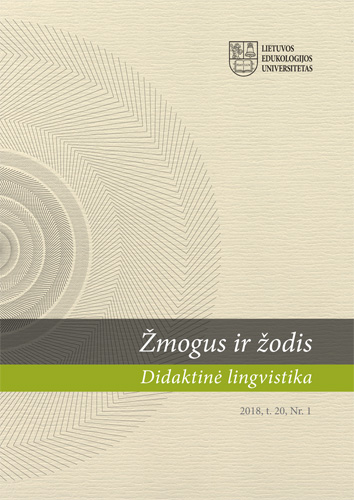Mečislovo Reinio ir Alfonso Gučo psichologijos vadovėlių vienažodžių terminų bendrybės ir skirtybės
Generalities and Differences between One-word Terms
of Psychology in the Texbooks of M. Reinys and A. Gučas
Author(s): Rita KatelytėSubject(s): Psychology, Lexis, Semantics, Baltic Languages
Published by: Vytauto Didžiojo Universitetas
Keywords: Mečislovas Reinys; Alfonsas Gučas; term of Lithuanian origin; term of international origin; psychological term; generality; difference;
Summary/Abstract: The purpose of this article is to compare the generalities and differences between the one-word terms of the psychology textbooks for secondary schools written by Mečislovas Reinys and Alfonsas Gučas; to analyse the terms according to their origin, as well as to compare them with the current terminology. The terms are taken from Psichologijos vadovėlis (Psychology textbook) by M. Reinys and Psichologija (Psychology) by A. Gučas. The article consists of two chapters. In the first chapter, the generalities of psychology terms are examined according to their origin and relation to the current terminology of psychology. Firstly, terms of the Lithuanian origin are considered; after that, terms of the international origin are explored. The second chapter deals with the eight differences between the terminology of M. Reinys’ and A. Gučas’ textbooks. After examining all the terms of psychology textbooks of M. Reinys and A. Gučas, it is concluded that the generalities between these two textbooks rest on 49 terms of different origin: 32 of them are of the Lithuanian origin, and 17 of the international origin. A great part of generalities include Lithuanian terms that indicate emotions and feelings, sensations, memory, or expression of imagination. The biggest part of generalities of the international origin refer to the terms derived from the Latin or Greek languages, representing emotions and feelings, mental processes and character types. After examining the differences in the terminology of the textbooks, it can be stated that M. Reinys chooses Lithuanian terms more often. Explaining the concepts, he gives preference to Lithuanian terms and Lithuanian synonyms, i.e. they are presented two or more times. The terminology of the textbook written by A.Gučas is closer to the current one – the author more often uses terms of the international origin that are used today. The psychology works of M. Reinys and A. Gučas make the basis for the current terminology of psychology. The study of generalities and differences of the one-time terms in these textbooks reveals that the early terminology of psychology has changed insignificantly compared to the present one. On the whole, most of the analysed one-time terms of these two textbooks are used in current psychology works retaining the same meanings.
Journal: Žmogus ir žodis
- Issue Year: 20/2018
- Issue No: 1
- Page Range: 14-23
- Page Count: 10
- Language: Lithuanian

